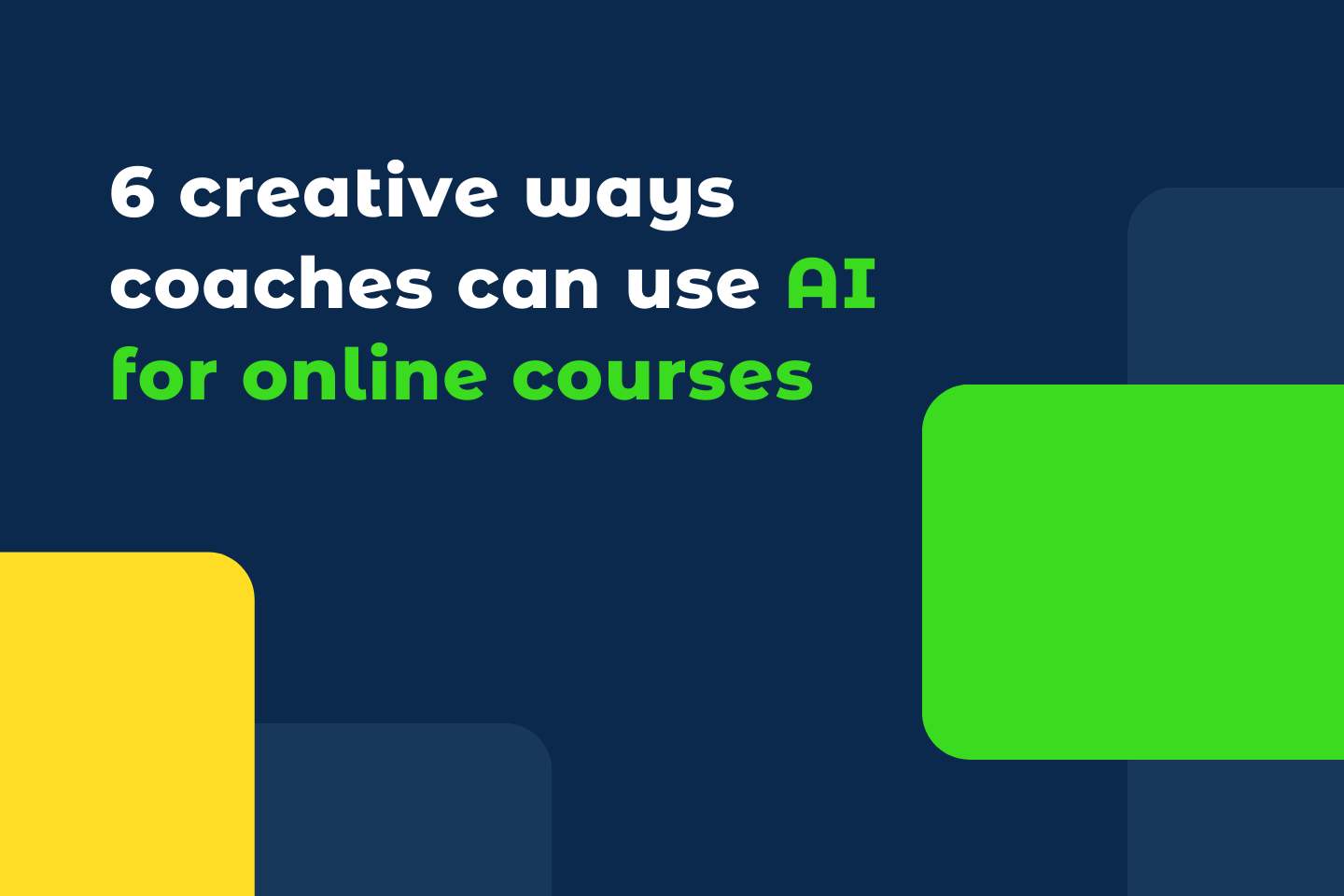Artificial Intelligence has emerged as a powerful tool for coaches to create personalized and engaging content, track progress, and offer targeted student feedback. With the ability to analyze vast amounts of data, AI can also identify patterns and trends that can help with goal setting and optimization of teaching strategies.
In this post, we will take a look at how to use AI to improve the online courses and elevate your teaching.
Personalized Learning Paths
Some coaches prefer productized learning, while others believe there’s no one-size-fits-all approach. For the latter, personalized learning paths are one of the best applications of AI in online coaching. AI algorithms analyze student data, such as their learning style, performance, and interests, to generate a tailored curriculum that meets their specific goals and challenges.
Personalized learning paths can be implemented in a variety of ways. For example, an AI-powered assessment can identify areas where a student is struggling and automatically adjust the difficulty level of the material to provide more targeted support. Coaches can also use AI to recommend additional resources or activities that align with the student’s learning objectives and interests.
The benefits of personalized learning paths are immense. By tailoring the learning experience to the individual student, coaches can improve engagement, motivation, and overall performance. When students believe what they are studying is relevant to and necessary for accomplishing their goals, they are more likely to stay involved and complete the course. At the same time, personalized learning paths also allow coaches to optimize their time and resources by focusing on areas where each student needs the most support.
Intelligent Chatbots
Intelligent chatbots are AI-powered tools that can simulate human conversation and provide instant assistance to students. They have the ability to evaluate massive volumes of data, such as student transcripts and course materials, in order to deliver personalized recommendations and support.
The ability of intelligent chatbots to assist students around the clock, seven days a week, regardless of their location or time zone, is one of their key advantages. This enables students to receive real-time feedback and encouragement, which can help them in staying on track and feeling more engaged in the learning process. Chatbots can also reduce the workload of coaches by automating routine tasks, allowing them to focus on more strategic and creative aspects of coaching.
Another benefit of intelligent chatbots is that they can improve the accessibility of online courses. Students who may be hesitant to ask questions or seek support in a traditional educational setting may feel more comfortable interacting with a chatbot. Additionally, chatbots can provide support in multiple languages, which can help make online courses more inclusive and accessible to a diverse student population.
Automated Grading
Grading can be a time-consuming and tedious task, especially in extensive online courses. Automated grading can help coaches grade assignments more quickly and accurately, which can improve the efficiency and effectiveness of online coaching. It can also help ensure that grading is more consistent and objective. Human graders can be influenced by various factors such as mood, fatigue, or personal bias, which can lead to inconsistent or unfair grading. AI-powered grading eliminates these subjective factors and provides a more consistent and reliable assessment of student performance.
The good thing is that automated grading can be used for various tasks. For instance, a machine learning system can be taught to identify particular words and phrases in short answer questions, enabling it to assess the precision and thoroughness of the student’s response. Similarly, an algorithm can analyze an essay based on its structure, grammar, and coherence, and provide a score based on pre-defined criteria.
It is crucial to remember, however, that automated grading may not be appropriate for all types of examinations. Some assessments, such as creative writing or projects, may require more subjective evaluation and judgment from human coaches. Additionally, automated grading may not always recognize nuances or complexities in student responses, which may require additional review by coaches.
Predictive Analytics
Predictive analytics is an AI-powered tool that can help coaches identify patterns and trends in student data to predict future outcomes. By using machine learning algorithms, predictive analytics to examine massive volumes of student data, such as previous academic performance, engagement indicators, and demographic information. These algorithms can detect patterns and connections in data and use them to forecast future outcomes. For example, predictive analytics can identify students who are consistently late in submitting assignments or who are not engaging with course materials, which may indicate a higher risk of dropping out.
Coaches can use this information to provide targeted support and resources to help these students overcome any obstacles and improve their performance. Predictive analytics can also help coaches optimize their time and resources by focusing their efforts on areas where they are most needed.
That said, it is important to use predictive analytics in an ethical and honest way. Coaches should also avoid making judgments or judgments based on sensitive demographic information such as race, gender, or socioeconomic position.
Natural Language Processing
NLP works by using machine learning algorithms to analyze and understand natural language. This includes identifying grammar, syntax, semantics, and even sentiment.
One of the most important advantages of NLP is that it allows coaches to deliver more individualized feedback and support to pupils. NLP can analyze student responses and provide feedback based on the student’s individual strengths and weaknesses, allowing coaches to provide actionable, real-time feedback and support. This can boost student engagement and motivation while also improving learning outcomes.
NLP can also help coaches save time and effort by automating routine tasks like answering frequently asked questions or assisting students who are struggling with a particular idea. This can save time and resources, allowing them to focus on other aspects of teaching.
It is crucial to highlight, however, that NLP is not always accurate or dependable. NLP relies on machine learning algorithms that are trained on large amounts of data, which may not always be representative or inclusive of all students. Additionally, NLP may not always recognize nuances or complexities in student responses, which may require additional review by coaches.
Gamification
Gamification is a creative approach that can help coaches increase student engagement and motivation by using game design principles and techniques in non-game contexts. It can be utilized in online coaching to provide a more immersive and dynamic learning experience, making it more entertaining and motivating for students.
The game elements, such as points, badges, leaderboards, and rewards create a more cohesive class session and a sense of progress, achievement, and competition. Students will be more engaged and motivated, which can help enhance their drive to continue studying.
For example, virtual coaches can use gamification to create a point system for completing assignments or participating in discussions, where students earn points for each completed task. They can also use badges to recognize and reward student achievements, such as completing a module or mastering a new concept. Leaderboards are also commonly used to instill a sense of rivalry in pupils, encouraging them to participate more actively in their studies. Gamification can also assist students in establishing a sense of community as they connect with and compete with one another.
It should be noted that the digital coach should ensure that the game elements used in gamification are relevant and meaningful to the learning outcomes, and do not distract from the main objectives of the course. Additionally, they should be transparent about the game elements used and how they are being used to motivate students.
How to Use AI for Online Courses: Final Thoughts
Artificial intelligence has the ability to transform the online coaching experience by offering coaches a choice of tools and approaches to improve student learning, engagement, and motivation. From personalized learning paths to intelligent chatbots, automated grading, predictive analytics, natural language processing, and gamification, AI offers coaches an unprecedented level of support and actionable insight into student performance.
However, it is important to utilize these tools ethically and wisely, and to ensure that they are linked with their students’ overall learning objectives and requirements. As technology advances, we should anticipate even more unique and creative techniques to leverage AI to improve the online coaching experience and student outcomes.

